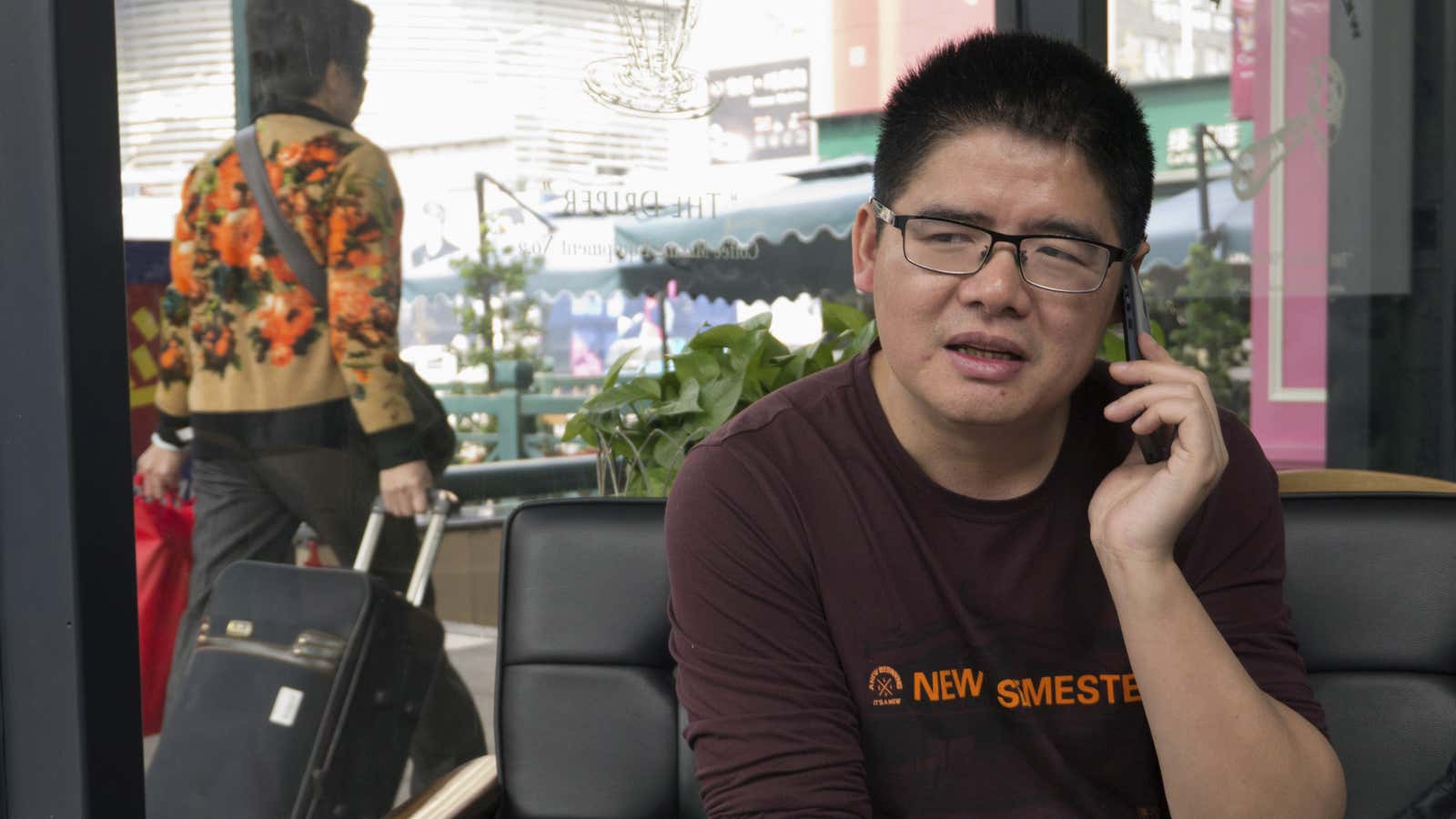The mother of Zeng Feiyang, a Chinese labor activist who has been detained since early December, is taking an unusual step to try to protect her son’s reputation—she’s suing Beijing’s powerful media outlet, Xinhua News Agency, for defamation.
Chen Wenying, 70, filed a case in the People’s Court of Baiyun District of Guangzhou City against the state news agency last month, demanding one million yuan (about $155,000) in compensation, after Xinhua ran an article (link in Chinese) on December 22 alleging her son had taken money from factory workers, had affairs with eight of them, and sent “vulgar” messages to women online. Because China’s media is highly censored and strictly controlled by the government, such allegations in Xinhua may be the only information many citizens hear about Zeng and his case.
“I know my son, he’s a good man,” Chen said in a telephone interview from a hospital ward in Guangzhou, where she was caring for her husband, who has late stage cancer. “Once the smear campaign came out, even old friends and relatives started having second thoughts about Feiyang’s character and moral behavior,” Chen said. “Even those who wouldn’t believe he’s capable of such things changed their minds after the Xinhua report,” she said.
Zeng is the director of the Panyu Workers Association, a Guangzhou-based organization mediating labor disputes and offering migrant workers legal assistance. His detention last year, for “gathering crowds to disturb public order,” came amid a massive crackdown on labor rights activists in southern China, as factories struggle with an economic downturn. At least seven activists, including Zeng, were detained or questioned for their roles in high profile labor disputes and strikes, like those at the Lide and Yue Yuan shoe factories.
The Xinhua article follows an increasingly familiar pattern for activists, journalists, publishers, and others who are detained in China. Long before any trial, reports alleging misdeeds from adultery to fraud appear in state media, sometimes accompanied by teary, televised confessions that many believe are coerced. The situation threatens detainees’ chance at a fair trial and undermines the rule of law, legal experts say.
Zeng and his colleague Meng Han remain in detention, but five other activists arrested have been released on bail. They are under constant surveillance in their hometowns and have been prevented from speaking to factory workers in Guangzhou, people close to them say. So far, Zeng hasn’t even been allowed to see his lawyer, his mother said.
“Something doesn’t seem right,” his mother said. “After four months only my son hasn’t been granted access to his defense attorney. If he broke the law, he will have to face the consequences, but I have to see my son so I can have some peace of mind. We need to know if he’s fine.”
“Since Zeng remains illegally incommunicado, his mother decided to take action,” Chang Weiping, the lawyer representing Chen, said in a telephone interview. The Xinhua report seriously violates investigation confidentiality by publicly making accusations about someone before a proper court ruling, Chang said, and violates Zeng’s privacy, which is protected under Chinese law.
Chen is suing Xinhua, its website Xinhua.cn, which ran the story, Zou Wei, the reporter who wrote it, and the Guangzhou Detention Center and the Panyu Security Bureau, which made Zeng’s arrest. She is demanding removal of the article and all related media, including a 24-minute video, from the website, publication of an apology on the front-page of all Xinhua media outlets for 30 days, and monetary compensation.
The court acknowledged receipt of the lawsuit in a stamped document on April 11.
Zou, the reporter, hung up when contacted by phone about the lawsuit. Xinhua employees in three different departments said they needed to refer questions to “superiors” and then hung up when Quartz asked to be connected to the superiors.
Local law enforcement and the detention center were also listed as defendants, Chang said, because “we believe they have facilitated confidential information to state media or even granted access to Zeng during his detention, while keeping his own attorney out of reach.”
The scope of this lawsuit is unprecedented, many human rights and legal experts said. Activist He Xiaobo, also detained in last year’s crackdown, has also tried to sue Xinhua, but his case has yet to be heard.
Chances Zeng’s case will be heard in court are slim, Chinese law experts say. “It is very difficult for this case to move forward within the Chinese court system,” said Joshua Rosenzweig, a Chinese criminal justice and human rights researcher based in Hong Kong. The court is likely to dismiss the case rather than spark a discussion about whether the state news agency is infringing on people’s legal rights.
Pablo Wang contributed reporting.
